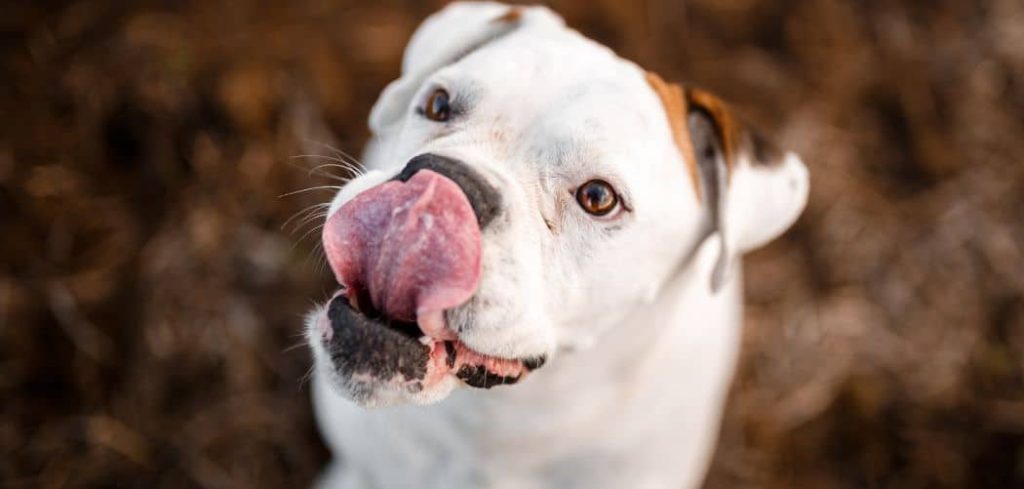It can be worrying to see your dog repeatedly licking their lips and swallowing, especially when it seems to happen out of nowhere.
While it might seem harmless at first, this behavior can indicate underlying medical issues that shouldn’t be ignored.
We outline the common reasons why your dog excessively licks their lips and swallows, what you can do at home, and when to seek veterinary help.
Dog Excessively Licking Lips and Swallowing — Why It Happens
When your dog excessively licks their lips and swallows, it’s often a sign of nausea, oral discomfort, anxiety, or even a more serious internal issue.
Dogs may do this due to acid reflux, dental pain, foreign objects stuck in the mouth or throat, or gastrointestinal upset. Sometimes, it’s a subtle way dogs express discomfort or attempt to soothe themselves when they feel unwell.
Neurological conditions and behavioral triggers like stress or obsessive-compulsive behaviors can also cause this repetitive motion.

Dog Excessively Licking Lips and Swallowing: Common Causes
Nausea and Gastrointestinal Upset
When a dog feels nauseous, they often lick their lips and swallow in response to the queasiness or increased salivation.
This is commonly seen before vomiting or when a dog is dealing with an upset stomach.
You might also notice lip-smacking, restlessness, or attempts to eat grass.
Conditions like gastritis, dietary indiscretion, or even motion sickness can trigger these symptoms.
Because the digestive system is involved, it’s essential to watch for additional signs like diarrhea, vomiting, or a lack of appetite.
Related: Dog licking lips excessively (Here’s why)
Acid Reflux (GERD)
Acid reflux, also known as gastroesophageal reflux disease (GERD), occurs when stomach acid flows backward into the esophagus.
This irritates the throat and mouth, causing dogs to lick their lips and swallow to relieve discomfort.
This can happen more often in the early morning or late at night when the dog’s stomach is empty. Some dogs will also burp or gag.
If the reflux continues over time, it can cause inflammation or ulcers in the esophagus.
Dogs with GERD often require dietary adjustments or medications to manage their symptoms.
Foreign Object in Mouth or Throat
If your dog suddenly begins licking their lips and swallowing, a foreign object could be lodged in their mouth, between their teeth, or stuck in the throat.
Grass awns, sticks, bits of food, or even toys can cause irritation or pain. Dogs may try to dislodge the object by licking and swallowing excessively.
In more severe cases, you might see pawing at the mouth, choking, or difficulty breathing, which requires emergency care.
Dental Pain or Oral Disease
Dogs experiencing dental problems—such as infected gums, loose teeth, or oral ulcers—may constantly lick their lips and swallow due to discomfort.
Bad breath, reluctance to eat, bleeding gums, and drooling can also point to dental disease. This is especially common in older dogs or breeds prone to dental issues.
Oral discomfort can escalate quickly, so timely dental evaluation is essential.
Anxiety or Stress
Behavioral causes like anxiety or fear can lead to compulsive licking and swallowing.
Dogs may do this in response to loud noises, separation, new environments, or changes in routine.
It’s their way of self-soothing. Other anxiety-related signs include pacing, trembling, panting, or hiding.
In cases of chronic stress, behavior modification and possibly medications may be needed to help your dog cope.
Seizure Activity or Neurological Disorders
In some cases, excessive lip licking and swallowing can be a subtle sign of seizure activity, particularly partial seizures.
These may not involve full-body convulsions but can manifest as repetitive, abnormal behaviors.
You might notice a glazed look, disorientation, or unresponsiveness during these episodes.
If neurological issues are suspected, your vet may recommend diagnostic imaging or a referral to a specialist.
What to Do If Your Dog Is Excessively Licking Lips and Swallowing
Start by observing the timing, frequency, and context of the behavior.
Did it begin after eating something unusual? Is your dog also drooling, gagging, or vomiting?
Try to keep your dog calm and avoid feeding them for a few hours if nausea is suspected.
Providing small, bland meals such as boiled chicken and rice can help settle the stomach if symptoms are mild.
Check your dog’s mouth for visible signs of injury, debris, or dental issues—but do so gently and only if your dog is cooperative.
If the behavior is related to stress, consider calming techniques such as a quiet environment, soothing music, or anxiety wraps.
Diffusing lavender or using calming pheromone sprays can also help anxious dogs feel more at ease.
Keep note of any additional symptoms such as vomiting, lethargy, coughing, or changes in appetite or behavior.
When to Call or Visit Your Vet
Seek veterinary attention promptly if your dog:
Is repeatedly licking lips and swallowing for more than a few hours
Shows signs of choking, gagging, or pawing at the mouth
Has vomited more than once or has persistent diarrhea
Appears lethargic or refuses to eat
Displays neurologic symptoms like confusion or unresponsiveness
Also contact your vet if your dog has a history of acid reflux, seizures, or chronic dental disease and the symptoms suddenly worsen.
Prompt diagnosis and treatment can prevent more serious complications and ensure your dog gets relief quickly.
Read more: Dog Licking Lips and Not Eating (What it means and what to do)
Key Takeaway
Excessive lip licking and swallowing in dogs is often a subtle signal that something isn’t right—whether it’s nausea, dental pain, or something more serious.
Pay attention to when and how often the behavior happens, and watch for any other concerning signs.
While some cases resolve with simple care at home, others require prompt veterinary attention.
Trust your instincts, and don’t hesitate to reach out to your vet if the symptoms persist or worsen. Your attentiveness could make all the difference in your dog’s comfort and health.
